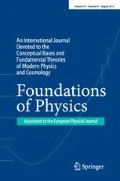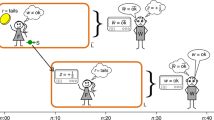Abstract
In an earlier paper written in loving memory of Asher Peres, we gave a critical analysis of the celebrated 1935 paper in which Einstein, Podolsky and Rosen (EPR) challenged the completeness of quantum mechanics. There, we had pointed out logical shortcomings in the EPR paper. Now, we raise additional questions concerning their suggested program to find a theory that would “provide a complete description of the physical reality”. In particular, we investigate the extent to which the EPR argumentation could have lead to the more dramatic conclusion that quantum mechanics is in fact incorrect. With this in mind, we propose a speculation, made necessary by a logical shortcoming in the EPR paper caused by the lack of a necessary condition for “elements of reality”, and surmise that an eventually complete theory would either be inconsistent with quantum mechanics, or would at least violate Heisenberg’s Uncertainty Principle.
Similar content being viewed by others
References
Aczel, A.D.: Entanglement: The Greatest Mystery in Physics. Four Walls Eight Windows, New York (2002)
Bell, J.S.: On the Einstein–Podolsky–Rosen paradox. Physics 1, 195–200 (1964)
Bohm, D.: A suggested interpretation of the quantum theory in terms of ‘hidden’ variables. I & II. Phys. Rev. 85, 166–193 (1952)
Bohr, N.: Can quantum-mechanical description of physical reality be considered complete? Phys. Rev. 48, 696–702 (1935)
Brassard, G., Méthot, A.A.: Can quantum-mechanical description of physical reality be considered incomplete? Int. J. Quantum Inf. 4(1), 45–54 (2006)
Einstein, A.: Statement by Einstein: He says he did not authorize report on quantum theory. New York Times, p. 21, 7 May (1935)
Einstein, A.: Letter to Erwin Schrödinger. Albert Einstein Archives, Hebrew University of Jerusalem, Folder 22, Document 47, 19 June (1935)
Einstein, A., Podolsky, B., Rosen, N.: Can quantum-mechanical description of physical reality be considered complete? Phys. Rev. 47, 777–780 (1935)
Isaacson, W.: Einstein: His Life and Universe. Simon and Schuster, New York (2007)
Mermin, N.D.: My life with Einstein. Phys. Today 58(12), 10–11 (2005)
Author information
Authors and Affiliations
Corresponding author
Rights and permissions
About this article
Cite this article
Brassard, G., Méthot, A.A. Can Quantum-Mechanical Description of Physical Reality Be Considered Correct?. Found Phys 40, 463–468 (2010). https://doi.org/10.1007/s10701-010-9411-9
Published:
Issue Date:
DOI: https://doi.org/10.1007/s10701-010-9411-9




